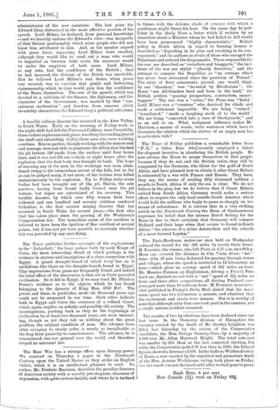The Times publishes further accounts of the explorations in the
Labyrinth," the huge palace built by early Kings of Crete, the most interesting detail of which perhaps is the evidence in statues and inscriptions of a close connection with Egypt. A grand draught-board of inlaid ivory": has on it medallions like those on the draught-boards found in Egypt. Clay impressions from gems are frequently found, and indeed the total effect of the discoveries is that art in Crete preceded civilisation. So it did in Egypt., if we may trust Mr. Flinders Petrie's evidence as to the objects which he has found belonging to the dynasty of King Men, 4750 B.C. The jewels and linen, in particular, made six thousand years ago could not be surpassed in our time. Such relics indicate both in Egypt and Crete the existence of a refined Court, which, again, implies an orderly, and possibly old, society. The investigations, pushing back as they do the beginnings of civilisation by at least two thousand years, are most interest- ing, though as yet they tell us nothing about the great problem, the original condition of man. His advance from utter savagery to steady order is nearly as inexplicable as the leap from passivity to consciousness. The advance, be it remembered, was not general over the world, and therefore obeyed no universal law.






































 Previous page
Previous page